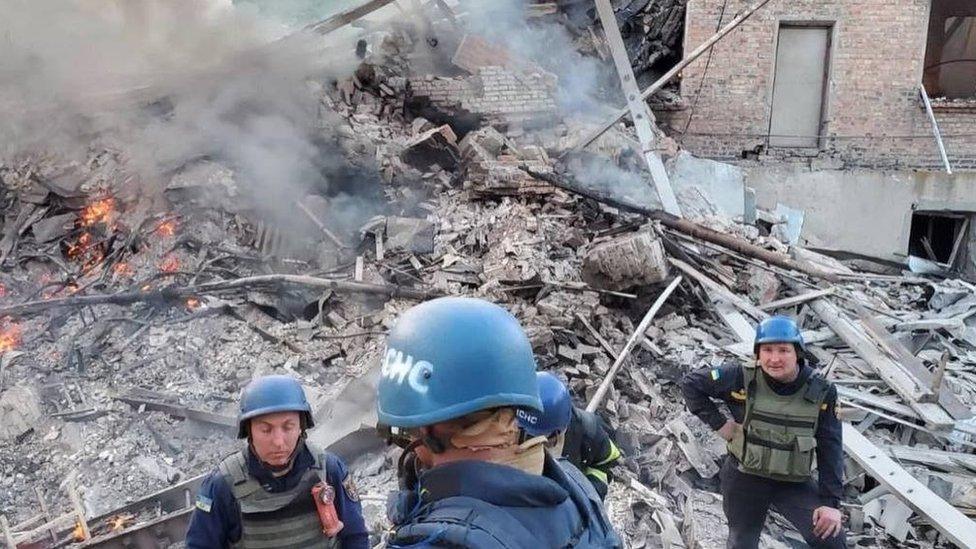Ukraine war: 60 people killed after bomb hits school, Zelensky says
- Published
Video shows the school mostly destroyed after the bombing
Around 60 people were killed after a bomb hit a school in east Ukraine, President Volodymyr Zelensky has said.
Earlier, the governor of Luhansk region, Serhiy Haidai, said 90 people had been sheltering in the building in Bilohorivka, and 30 were rescued.
Mr Haidai said a Russian plane had dropped the bomb on Saturday - Russia has not commented.
Luhansk has seen fierce combat as Russian troops and separatist fighters seek to surround government forces.
Much of the region has been under the control of Russia-backed separatists for the past eight years.
Bilohorivka is close to the government-held city of Severodonetsk, where heavy fighting was reported in the suburbs on Saturday. One Ukrainian newspaper, Ukrayinska Pravda, says the village became a "hot spot" during fighting last week.
The blast brought down the building which caught fire and it took firefighters three hours to extinguish the blaze, according to the governor, writing on Telegram, external.
He said almost the entire village had been sheltering in the basement of the school.
The final death toll would only be known when the rubble had been cleared, the governor said.
The UN Secretary General Antonio Guterres said he was "appalled" by the deadly attack, adding: "civilians must always be spared in times of war".

Rescuers in Bilohorivka
Elsewhere in the country, Ukrainian fighters at a steelworks in the port of Mariupol have told the world they will not surrender to Russian forces and have appealed for help to evacuate their wounded.
Russia has besieged the area for weeks, calling on defenders from the Azov battalion to lay down their arms.
But in a live news conference from the partially destroyed plant, members of the battalion said they would not give in.
One of them, Lt Illia Samoilenko, said: "Surrender for us is unacceptable because we can't grant such a big gift to the enemy."
He added: "We are basically dead men. Most of us know this. It's why we fight so fearlessly."
The fighters also criticised the Ukrainian government, saying it had failed in the defence of Mariupol. But President Volodymyr Zelensky hit back, saying Ukraine did not have the heavy weaponry needed to unblock the city and that it was his own diplomatic efforts that had secured the evacuation of all civilians trapped inside the steelworks.
The International Committee of the Red Cross (ICRC), responsible for coordinating evacuations from Mariupol alongside the UN, said 170 civilians arrived in the relatively safe city of Zaporizhzhia from Mariupol on Sunday.
In a statement, the international arm of the Red Cross said the four-day operation, which began on 5 May, "included the evacuation of 51 civilians from Azovstal".
Earlier in May, around 500 people were evacuated from Azovstal and the Mariupol area to Zaporizhzhia, the ICRC said.
Also on Sunday, in a speech commemorating World War Two, President Zelensky accused Russia of implementing "a bloody reconstruction of Nazism" and said the Russian army was replicating wartime "atrocities".
Footage in the Ukrainian leader's video address showed him against a backdrop of destroyed residential buildings.
At the same time, Western governments have continued to show their support for Ukraine's struggle.
Later on Sunday, Ukraine's president held talks with G7 leaders - including US President Joe Biden and the UK's Boris Johnson - via video conference.
After the meeting, the leaders pledged their continuing support to Ukraine and their determination to wean themselves off Russian oil supplies. Payments for Russian energy amount to millions of dollars each day and help fund Russia's war effort.
The prime minister of Canada, Justin Trudeau, also met Mr Zelensky in person after making an unannounced visit to the town of Irpin, near Kyiv, that was ravaged by Russian forces early in the invasion.
At a news conference afterwards, Mr Trudeau announced further military help for Ukraine.
The speaker of the German Bundestag met Mr Zelensky in Kyiv on Sunday, too, while US First Lady Jill Biden crossed into Ukraine from Slovakia to meet Mr Zelensky's wife, Olena Zelenska.
Since Russia's invasion began on 24 February, the UN has recorded at least 2,345 civilian deaths and 2,919 injured in Ukraine, the High Commissioner for Human Rights said in an update, external last month. Thousands of combatants are also believed to have been killed or injured on both sides.
More than 12 million people are said to have fled their homes since the conflict began, with 5.7 million leaving for neighbouring countries and another 6.5 million people thought to be displaced inside the war-torn country itself.

War in Ukraine: More coverage
